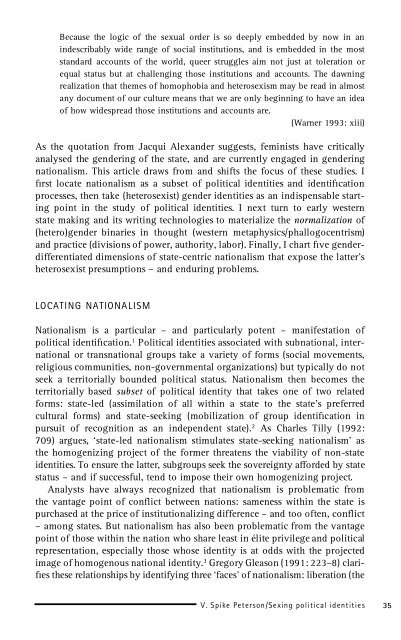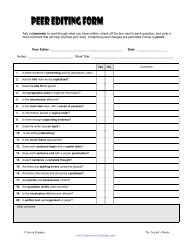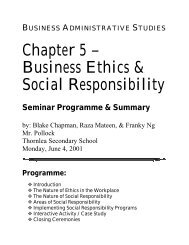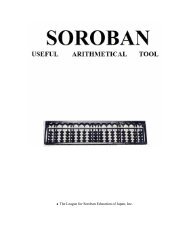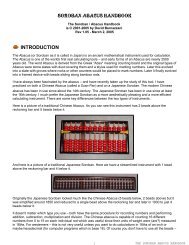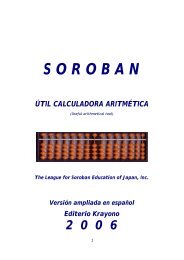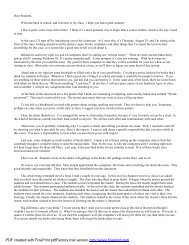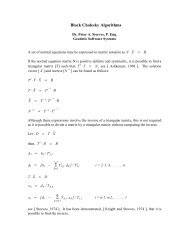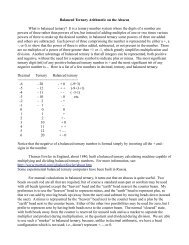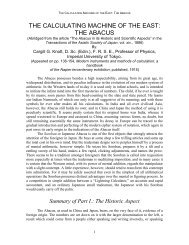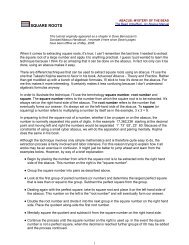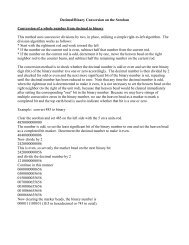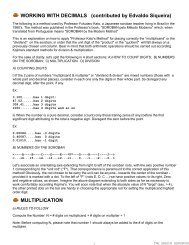Sexing Political Identities-Nationalism as Heterosexism.pdf
Sexing Political Identities-Nationalism as Heterosexism.pdf
Sexing Political Identities-Nationalism as Heterosexism.pdf
You also want an ePaper? Increase the reach of your titles
YUMPU automatically turns print PDFs into web optimized ePapers that Google loves.
Because the logic of the sexual order is so deeply embedded by now in an<br />
indescribably wide range of social institutions, and is embedded in the most<br />
standard accounts of the world, queer struggles aim not just at toleration or<br />
equal status but at challenging those institutions and accounts. The dawning<br />
realization that themes of homophobia and heterosexism may be read in almost<br />
any document of our culture means that we are only beginning to have an idea<br />
of how widespread those institutions and accounts are.<br />
(Warner 1993: xiii)<br />
As the quotation from Jacqui Alexander suggests, feminists have critically<br />
analysed the gendering of the state, and are currently engaged in gendering<br />
nationalism. This article draws from and shifts the focus of these studies. I<br />
rst locate nationalism <strong>as</strong> a subset of political identities and identication<br />
processes, then take (heterosexist) gender identities <strong>as</strong> an indispensable starting<br />
point in the study of political identities. I next turn to early western<br />
state making and its writing technologies to materialize the normalization of<br />
(hetero)gender binaries in thought (western metaphysics/phallogocentrism)<br />
and practice (divisions of power, authority, labor). Finally, I chart ve genderdifferentiated<br />
dimensions of state-centric nationalism that expose the latter’s<br />
heterosexist presumptions – and enduring problems.<br />
LOCATING NATIONALISM<br />
<strong>Nationalism</strong> is a particular – and particularly potent – manifestation of<br />
political identication. 1 <strong>Political</strong> identities <strong>as</strong>sociated with subnational, international<br />
or transnational groups take a variety of forms (social movements,<br />
religious communities, non-governmental organizations) but typically do not<br />
seek a territorially bounded political status. <strong>Nationalism</strong> then becomes the<br />
territorially b<strong>as</strong>ed subset of political identity that takes one of two related<br />
forms: state-led (<strong>as</strong>similation of all within a state to the state’s preferred<br />
cultural forms) and state-seeking (mobilization of group identication in<br />
pursuit of recognition <strong>as</strong> an independent state). 2 As Charles Tilly (1992:<br />
709) argues, ‘state-led nationalism stimulates state-seeking nationalism’ <strong>as</strong><br />
the homogenizing project of the former threatens the viability of non-state<br />
identities. To ensure the latter, subgroups seek the sovereignty afforded by state<br />
status – and if successful, tend to impose their own homogenizing project.<br />
Analysts have always recognized that nationalism is problematic from<br />
the vantage point of conict between nations: sameness within the state is<br />
purch<strong>as</strong>ed at the price of institutionalizing difference – and too often, conict<br />
– among states. But nationalism h<strong>as</strong> also been problematic from the vantage<br />
point of those within the nation who share le<strong>as</strong>t in élite privilege and political<br />
representation, especially those whose identity is at odds with the projected<br />
image of homogenous national identity. 3 Gregory Gle<strong>as</strong>on (1991: 223–8) clari-<br />
es these relationships by identifying three ‘faces’ of nationalism: liberation (the<br />
V. Spike Peterson/<strong>Sexing</strong> political identities 35


